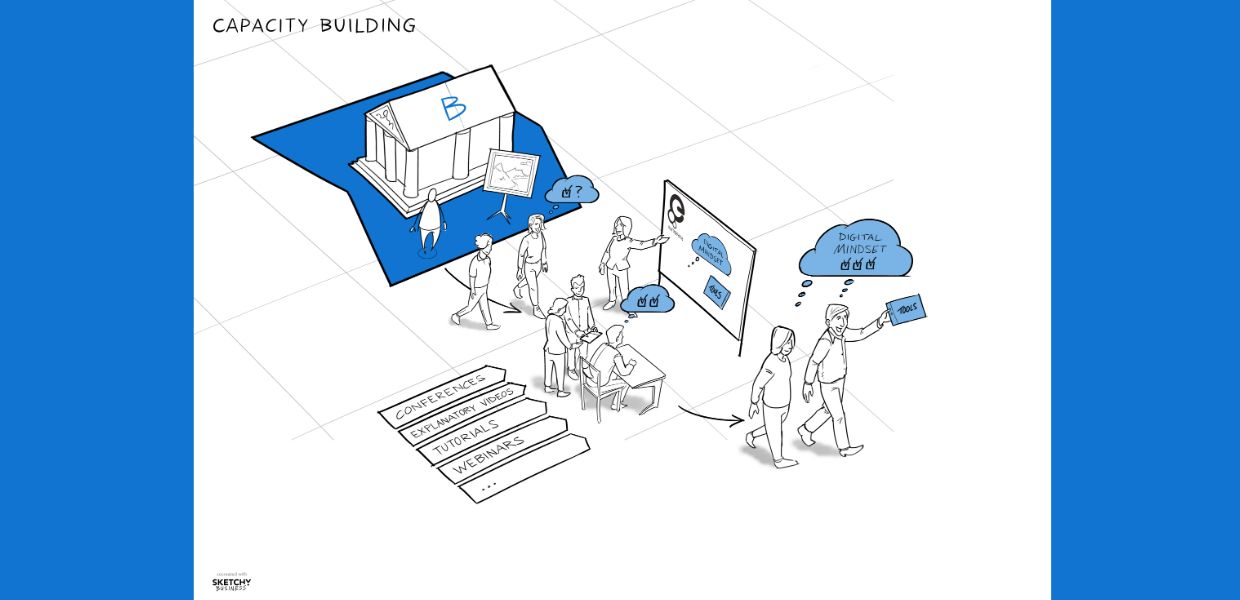Cultural heritage institutions differ significantly, depending on the type of collections they manage, their domain, their funding, their relation to Europeana, and their experience with and openness towards technical innovation. Digital transformation is particularly challenging for small and medium institutions with limited internal skills and capacity.
Through the new strategy, the Europeana Initiative will support all institutions in their digital transformation. What does that mean? It means that we will showcase the importance and value of digitisation and the adoption of standards, best practice and common solutions in making quality content that is useful for a global online audience.
Training and skills for digital transformation
Europeana will be the place that cultural heritage professionals turn to for guidelines on topics such as digitisation, metadata enrichment, semantic interoperability, content creation, licensing, reuse, business models and innovation. They’ll find this information on our website Europeana Pro, through their membership of the Europeana Network Association (join now!) or Europeana Aggregators’ Forum and through physical and digital events such as conferences, workshops and webinars.
To build the skills and capacity that institutions and individuals need, we need to truly understand the needs of the cultural heritage sector. You can see this in action in our phased project to help us identify and shape a capacity-building framework for the sector. This project includes a series of peer-to-peer workshops being run throughout June 2020, in which 60 cultural heritage professionals discuss ‘Digital transformation in the time of COVID-19’. The outcomes of the workshops and an accompanying report from Culture24 will shape the next phase of this project as we involve more voices from across the sector and continent.
Workshop participants seek to prepare for a successful digital future by understanding the sector’s full potential and challenges. As Jasper Vissor, one of the workshop facilitators writes, ‘within the GLAM sector, different realities exist at the same moment. One organisation’s strength is another organisation’s challenge... Together, we will look to understand the complex dynamics of what enabled some GLAMs to face the crisis proactively while others struggle, and what success actually means and looks like for digital cultural heritage in a post-COVID-19 world.’
Developing networks that support digital transformation
Three organisations make up the Europeana Initiative - the Europeana Foundation, the Europeana Network Association and the Europeana Aggregators' Forum. The new strategy will see both the Europeana Aggregators’ Forum and the Europeana Network Association supported and structured so that they can raise awareness, build partnerships, enable peer-to-peer working and reach out to the research, education and creative sectors.
Julia Fallon is the Manager of Europeana Foundation's Community and Partner Engagement Team. She says, 'Connecting to a strong professional network can be a game-changer, providing opportunities for growth, collaboration and inspiration, and help you find a home among like-minded professionals. Our Networks, Forum and Communities will evolve to provide tangible opportunities that support individual and organisational development. And they will provide a welcoming space for emerging professionals and those wanting to start a conversation with their peers on things that matter to them.'
Strengthening national infrastructures
As mentioned right at the start of this post - all cultural heritage institutions are different. And one of the things that makes them so is that they work within not only the systems - and aspirations - of their own institution, but the processes and policies of their national infrastructures. Each country’s approach to culture, and to digital, is different.
Through this strategy, we will work with Member States to achieve greater harmony with national policies on digital culture, and we’ll work to correct the uneven distribution of national aggregators across Member States.
We want to make sure that all institutions are aware of the value of digital culture and that they have the support they need to invest resources in contributing their collections to Europeana. Finally, we want to appeal to all who believe in the transformative power of digital culture to act as ambassadors within their own countries.


